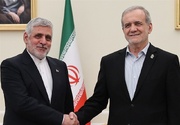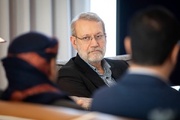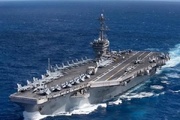"The Oman talks are one of dozens of tasks for the Ministry of Foreign Affairs," the Leader of the Islamic Revolution Ayatollah Seyyed Ali Khamenei said in his meeting with a group of high-ranking officials from three branches of the Iranian government on Tuesday.
The Leader of the Islamic Revolution also said that the country's issues must not be tied to the talks.
"We are neither overly optimistic nor overly pessimistic about these talks," Ayatollah Seyyed Ali Khamenei said while referring to the first round of indirect negotiations between Tehran and Washington in Oman on Saturday.
After all, it is a decision and a move that has been made and has been implemented well in the first steps, the Leader noted.
He continued, "Of course, we are very pessimistic about the other side, but we are optimistic about our own abilities."
Recalling the mistakes made during the JCPOA agreement in 2015, the Leader of the Islamic Revolution said, "The mistake we made in the JCPOA should not be repeated."
"During the JCPOA, we conditioned the country and made everything dependent on the progress of the negotiations," he said.
"Investors will not invest when they see that the country is dependent on negotiation," he underlined.
“The negotiations may or may not yield results. We are neither too optimistic nor too pessimistic about them. Of course, we are very skeptical of the other party, but confident in our own capabilities,” the Leader said.
“The removal of the sanctions is not in our hands, but neutralizing them is; there are many ways and [there is] great domestic capacity to do that. If this objective is achieved, the country will become impervious to sanctions,” the Leader said.
Ayatollah Khamenei said the first steps in the current talks with the United States have proceeded satisfactorily. He urged officials to continue the negotiations with similar care hereafter.
The remarks came after Iran and the US held talks in the Omani capital last Saturday, with Oman's foreign minister functioning as the mediator, according to Press TV.
The Islamic Republic has asserted that the talks were solely aimed at addressing the US’s illegal and unilateral sanctions against the country, and various aspects of the Iranian nuclear energy program, strongly rejecting speculation about the process’s involving other issues.
The United States lifted some of the sanctions as per the Joint Comprehensive Plan of Action (JCPOA), a historical 2015 nuclear agreement between Iran and world powers. Washington, however, returned the bans three years after conclusion of the deal, and even began piling up more coercive measures on the Islamic Republic. The US has termed the adversarial approach as “maximum pressure,” which has also seen American officials’ repeatedly threatening to use military force against the Iranian soil.
The Islamic Republic has, meanwhile, underscored that any direct negotiations with the US were neither useful nor acceptable for Tehran as long as Washington retained its hostile policies.
MNA/


























Your Comment